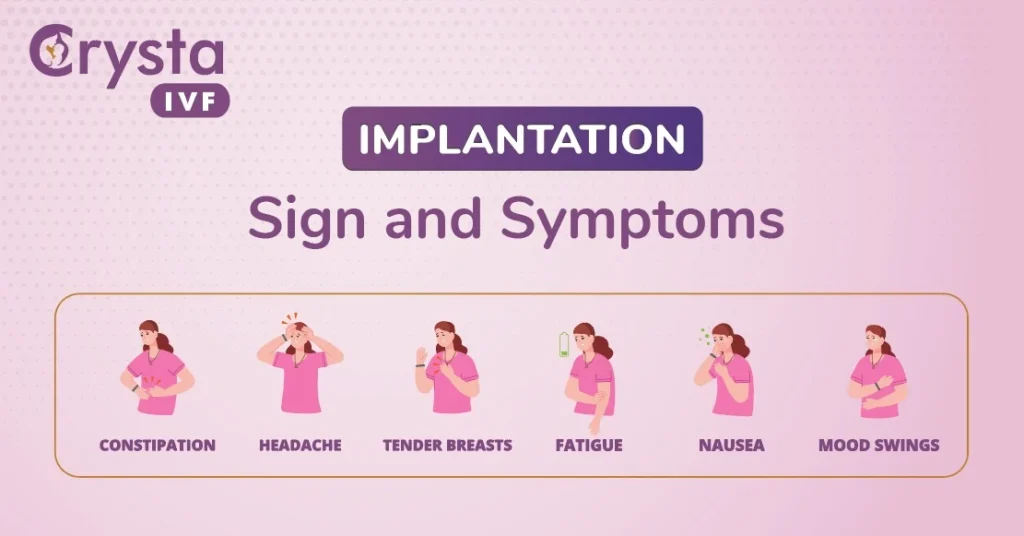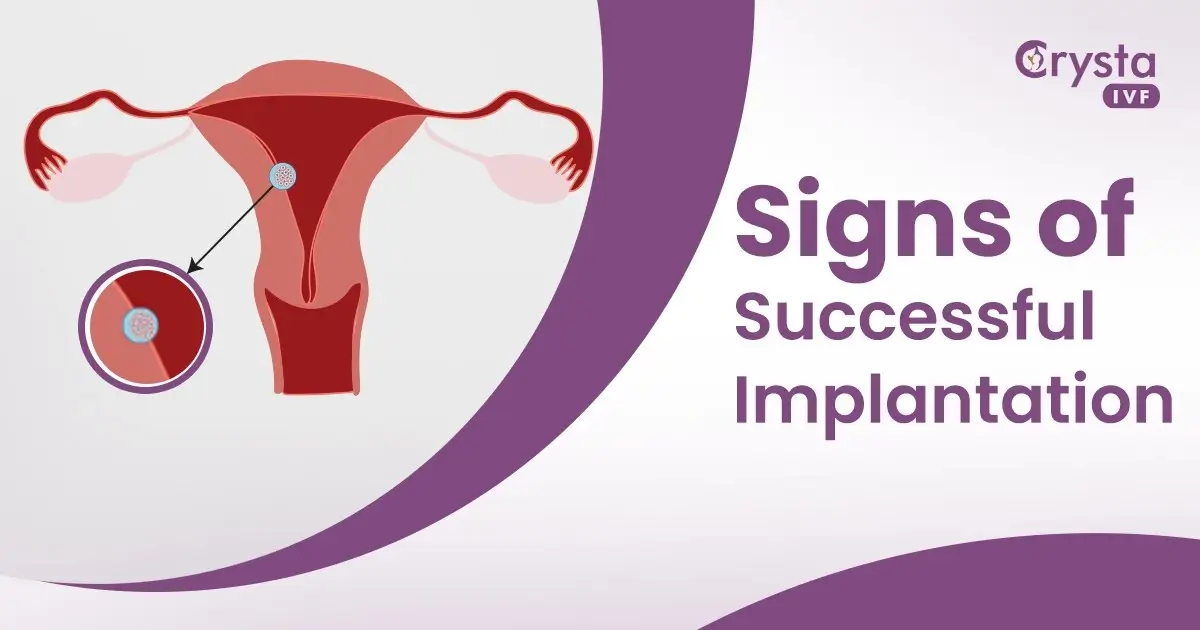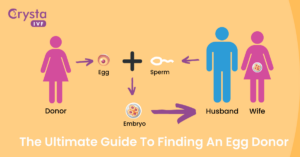
Medically Reviewed By
Dr. Nidhi Sehrawet

After an embryo transfer, the waiting period can feel endless and filled with questions. One such question women ask is about how to know if the implantation was successful. Well, Implantation is one of the most important steps in the IVF journey, as it marks the moment when the embryo attaches to the uterine wall and begins to grow.
During this time, your body may start showing some signs that things are moving in the right direction. In this blog, we’ll help you understand the positive signs of successful implantation, what they mean, and when to expect them.
What is Implantation and Why Does It Matter in IVF?
In simple words, implantation means when a fertilised egg cell attaches itself to the wall of the uterus through the placenta. For the embryo to implant successfully, the uterine lining must be healthy, thick, and receptive.
There are 4 stages of implantation, which generally take 9 days after ovulation to attach to the uterine lining, but sometimes it may occur as early as 7 to 8 days or as late as 12 days. If ovulation occurs on the 14th day after a period (average 28-day cycle), implantation might appear on the 23rd day.
Implantation matters in IVF because:
- It marks the beginning of IVF.
- It determines IVF success.
- Once the embryo implants, your body begins producing hCG (human chorionic gonadotropin), the hormone detected in pregnancy tests.
- It supports Embryo Growth by receiving nutrients and oxygen from the uterine lining.
How Long After Embryo Transfer Does Implantation Occur?
Implantation is a critical step in IVF, but it doesn’t happen immediately after the embryo is transferred. Typically, implantation occurs 6 to 10 days after embryo transfer, depending on factors like embryo quality, uterine lining receptivity, and hormonal support.
10 Common Signs of Successful Implantation After IVF
Every woman is different and so is the pregnancy. Successful implantation occurs in the early stages of pregnancy. There are some common symptoms that a woman notices during implantation, although not all women feel the same symptoms during implantation, or some might not experience them at all.
Here are 10 possible successful implantation symptoms after IVF:

Bleeding
According to the Cleveland Source, it shows that 25% of women experience bleeding during their first trimester. This might not be very clear because it happens when your period starts. The stains will be lighter than your regular menstrual period and may be pink or brown.
However, it is difficult to differentiate between implantation bleeding vs periods, so you must confirm implantation with a pregnancy test.
- Colour: Light pink or brown
- Timing: Usually 6–10 days after embryo transfer
Cramps
Early pregnancy starts with rapid hormonal changes. Implantation triggers the hormone surge and causes cramping. Some women feel abdominal tenderness, back pain, and cramps during implantation. These are the mild symptoms of how you feel before your period.
- Feeling: Dull or mild cramping in the lower belly
- Timing: Around 6–10 days post-transfer
Discharge
During ovulation, the mucus will be clear, stretchy, and slippery. After implantation, your mucus has a thicker and stickier texture and is clear or white. Early pregnancy, rising progesterone, and estrogen cause mucus to become thicker and white or yellow. Hence, noticing the mucus discharge, you can know if your implantation has taken place.
- Cause: Progesterone increases cervical mucus
- Timing: Early implantation phase
Bloating
The rise in hormone levels of progesterone may slow your digestive system, and you might feel bloated. Bloating is common during implantation and periods and not everyone will experience the same signs or symptoms. Consult with your doctor about the symptoms for accurate assessment.
- Cause: Rise in progesterone slows digestion, leading to gas and bloating.
- Timing: Common around implantation and early pregnancy.
Tender breasts
After successful implantation, tender or sensitive breasts are common symptoms during the early stages of pregnancy. This is because of hormonal changes as the levels of hCG, estrogen, and progesterone all increase rapidly. The body prepares for a potential pregnancy, supporting the development of the uterine lining and the maintenance of a fertilised egg. During this period, some women may experience hormonal shifts that lead to breast changes. The breasts might become more tender, sore, or swollen.
- Feeling: Soreness or heaviness
- Cause: Rise in progesterone and estrogen
Nausea or Changes in Appetite
This is one of the most popular signs of early pregnancy. Increased levels of progesterone slow down your digestion and make you feel nauseous. Rising hCG levels and a more sensitive sense of smell can make the problem worse. Hence, some women start avoiding some specific foods, such as onions.
- Cause: Increased progesterone slows digestion; rising hCG levels and heightened sense of smell contribute.
- Timing: It can appear early during implantation or the first weeks of pregnancy.
Headaches
Hormonal changes during pregnancy in the first trimester cause headaches in the early stages of implantation. Furthermore, headaches can be caused by a variety of factors, including hormonal fluctuations, stress, dehydration, lack of sleep, and other health conditions.
- Cause: Hormonal fluctuations, especially progesterone and estrogen, may trigger headaches.
Changes in Mood
Changes in mood, such as mood swings or heightened emotions, are due to estrogen and progesterone fluctuations. This can make you feel sad or happy in no time. In the early stages, the body undergoes significant hormonal shifts to support the developing fetus.
- Cause: Hormone fluctuations (progesterone, estrogen)
- Timing: Early implantation
Changes in Basal Body Temperature
Checking BBT(Basal Body Temperature) means taking your temperature every morning at the same time before getting out of bed. Usually, the temperature is lower before ovulation and then increases. During implantation, the temp drops for one day and then rises again. If you are trying to conceive and are charting your BBT, it is helpful to track your menstrual cycle.
- Cause: Hormonal changes supporting early pregnancy
- Timing: Often noticeable 1–2 days after implantation
Fatigue or Sleepiness
Feeling tired or sleepy is a successful implantation symptom. After the embryo attaches, progesterone levels rise to support pregnancy, which can make your body feel more exhausted than usual. Even simple daily tasks may feel tiring, and you may notice a strong need for rest.
- Cause: Increased progesterone levels
When to Take a Pregnancy Test for Implantation Success?
After implantation, your body starts producing hCG (human chorionic gonadotropin), which helps indicate pregnancy. However, it takes a few days for hCG levels to rise enough to be detected by a test. Taking a pregnancy test too early can lead to a false negative, causing unnecessary stress.
Here is when you should take a pregnancy test after implantation:
- Blood Test: Provides the most accurate findings by detecting hCG as early as 7 days after implantation.
- In-house Urine Test: Since hCG takes time to accumulate in urine, it is best to take the test 10–14 days following implantation.
- After a Missed Period: Waiting at least 1-2 days after missing your period can give accurate results.
What are the Positive Signs of Successful Implantation Without Bleeding?
Not all women experience implantation symptoms such as bleeding, and its absence does not mean that implantation has failed. Many women go through early implantation quietly, noticing only subtle changes in their bodies. These signs are mostly related to hormonal shifts and your body adjusting to early pregnancy.
Here are some common signs you may notice, even if there’s no bleeding:
- Breast Tenderness
- Fatigue or Sleepiness
- Nausea or Changes in Appetite
- Increased Vaginal Discharge
- Frequent Urination
Note: Everyone’s experience is different. Absence of bleeding is normal and doesn’t indicate failure of IVF. You must always confirm pregnancy with your doctor. Connect with Senior IVF Specialist Dr. Nidhi Sehrawet and clear all your doubts.
What Are the Signs of Unsuccessful Implantation?
While implantation is a delicate and crucial step in IVF, sometimes the embryo may not attach to the uterine lining, resulting in unsuccessful implantation. It’s important to remember that the absence of pregnancy does not mean anything is “wrong” with your body; it may happen for a variety of medical reasons and is often out of your control.
Here are some signs that may indicate implantation was unsuccessful:
- The absence of any spotting or light bleeding during the typical 6–10 day window/
- A normal basal body temperature without a slight rise can be an early clue.
- Absence of breast tenderness, fatigue, nausea, or mood changes may signal that implantation did not occur.
- Period-like bleeding returning on schedule often indicates that implantation did not happen.
- A blood or urine test showing no hCG confirms that pregnancy has not occurred.
Also Read: How Soon Can a Pregnancy Test Be Taken After Implantation?
When to Contact Your Doctor for Unsuccessful Implantation?
While implantation can sometimes fail without obvious signs, it’s important to know when to seek professional guidance. Contacting expert doctors at Crysta IVF can help you receive proper assessment, emotional support, and advice for your next steps in fertility treatment.
You should contact Crysta IVF for unsuccessful implantation when:
- You experience menstrual bleeding around the expected time.
- A blood or home pregnancy test showing no hCG confirms no implantation.
- Heavy cramping, intense abdominal pain, fever, or abnormal discharge should be evaluated immediately.
- If unsuccessful implantation occurs multiple times, the doctor will check underlying causes and suggest personalised treatment methods.
Summing It Up
Implantation marks the beginning of a pregnancy journey. Abdominal cramping, spotting, and breast changes might be some signs of pregnancy implantation, but it is challenging to find an accurate symptom that guarantees 100% implantation.
As mentioned earlier, the symptoms might differ from person to person, and sometimes, no symptoms at all appear in some women. Hence, a pregnancy test can only confirm successful implantation.
FAQs About Signs of Successful Implantation After IVF
1. How do I know if implantation is successful after embryo transfer?
Successful implantation may show subtle signs like mild cramping, fatigue, breast tenderness, or nausea. Some women may notice light spotting (implantation bleeding).
2. When does implantation occur after IVF?
Implantation typically occurs 6 – 10 days after embryo transfer. The exact timing depends on embryo quality, uterine lining health, and hormonal support.
3. Is implantation bleeding a sure sign of pregnancy?
No. Implantation bleeding can indicate early pregnancy, but not every woman experiences it. Its absence does not mean implantation has failed.
4. Can you feel implantation cramps?
Yes, some women feel mild, dull cramps when the embryo attaches to the uterine lining. These are usually short-lived and much lighter than menstrual cramps.
5. Can I have no symptoms and still have a successful implantation?
Yes. Many women do not notice any symptoms and still have a successful implantation.
6. When should I take a pregnancy test after embryo transfer?
For accurate results, take a home pregnancy test 6 – 10 days after embryo transfer.
7. What foods help implantation after IVF?
Eat a balanced, nutrient-rich diet including fruits (banana, apple, pomegranate), vegetables, protein sources (eggs, lentils, yoghurt), and whole grains.
8. Does stress affect implantation success?
Yes, high stress levels may negatively impact hormonal balance, blood flow, and overall well-being, which can affect implantation.




